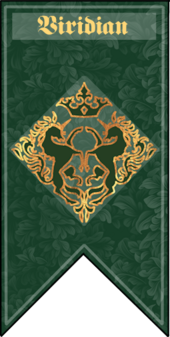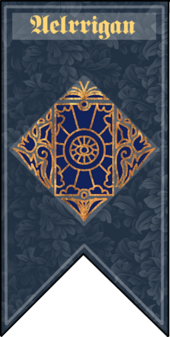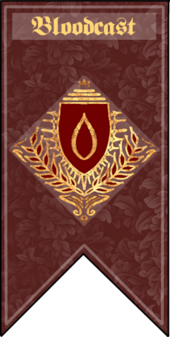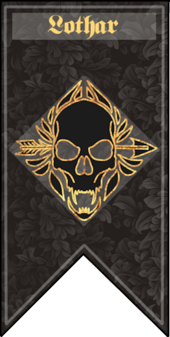More actions
| Expanded Knights Lore | |
|---|---|
| Part of Knights lore. |
Knighthood, while mostly an Ailor concept, exists across the world of Aloria in different forms. While Knighthood offers unique experiences and status, its believability must be preserved, and so the lore around it is fairly strict. Knights are divided into Orders that share an oath and a purpose, with each Order further subdivided into more specialized Chapters. Knighthood is a very good way to get involved in pre-existing groups and activities, guaranteeing people to connect to and a reason to log on. Knighthood also grants a unique rank system for Characters to progress up the ladder of their Order and gain privileges for being honest to their Code and effective at enforcing it. Knight roleplay does require reading, however, as Knight Characters must follow their Codes or risk expulsion.
Becoming a Knight
Becoming a Knight can either be done as backstory, or In-Character. Knighthood is a commitment from the player to invest in the lore and activities around Knighthood, pre-determining allies and enemies, and coming with some accountability. Most Knights are trained from youth, becoming Squires at the age of 13 and graduating as Rank-Knights at the age of 21. A Character can also be created as an 18-20 year old Squire, who is advanced in their training, but not all the way graduated yet. Non-Knight Characters can also be recruited In-Character as adult Squires and trained to become full Knights. While technically Knights should spend at least 8 years training, for the sake of availability of Roleplay, the minimum requirement for an In-Character recruited Squire to become a Knight is 3 months of dedicated play (meaning, not switching to other Characters, or shelving for that period). At the end of this period, a Ticket may be made to Lore Staff to assess whether the Character would pass evaluation by the Order.
Designing a Knight
Knights should be designed in line with the fantasy imagining of a Knight, the quintessential fighter on horseback with a lance or sword or shield, wearing heavy armor. It is important that Knights don't become rogues who fight with daggers, or become too far removed from the pop culture understanding of what a Knight is. Players should gravitate towards this design: using melee weapons and/or shields, favoring chainmail or heavy armor, and appealing to class, dignity, or having a formal grace as is becoming of someone who is treated as pseudo aristocracy and supposedly one of the finest warriors in the Empire. Being on horseback is optional, since Mounts are a for-purchase-feature in Roleplay. For further design ideas, refer to the individual Order pages.
Knight Orders
Knighthood is split between a variety of Orders which all represent some kind of central theme or thought. Below are listed all available Knight Orders, and a very quick summary of their work, while also linking to their individual Pages for more detail. A private registry of all played knights can be found here. Only Knights of a specific order can ICly view their membership roster.

|

|

|

|
|---|---|---|---|
| The Viridian Order is the grandfather of all Regalian Knight Orders, popularizing the term Knight, and holding the other Orders to a high standard of Honor. | The Aelrrigan Order is an Order of Knights and Mages who seek to both protect and regulate the Mage population to avert doom in the world from Prophecy. | The Bloodcast Order rose from instability in the Viridian Order, turning away from the wealthy and protecting the poor as the essential Hedge Knights. | The Lothar Order exists as an anti-Magic and anti-Occult radical Knight Order ostensibly to hunt Vampires, but to extend that destruction to all Occult. |
Privileges and Limitations
All Knights gain certain social privileges, as well as Knighthood expectations. The expectations form through a code of conduct which requires Knights to react a certain way to some roleplay scenes, or to avoid doing a particular thing. Privileges are unique things that Knights are allowed to do that no other type of Character can do (though some overlap may exist with for example Noble House Guards). Each Knight Order is subject to the so-called "Common Knight Code", while each Order also has a separate code of conduct called the "Internal Code". Failing to live up to these Codes can result in an investigation, demotion, and in the worst case scenario, expulsion from the Order. Some Orders, like the Lothar, are exceptionally sour towards traitors, and may issue a hit-squad to take out anyone who abandons their duties.
All Knights are tasked with the duty of ensuring that each of them, regardless of order affiliation, holds to the Common Knight Code, as well as their Interal Code to a lesser degree. The latter is more complicated, because different Orders don't always understand the complex nuances of Internal Codes, or are hostile to each other's purpose. The following Order rivalries should be noted:
- The Aelrrigan and Lothar Orders have opposing views on the Occult, and both will always reject a report from the other Order's knights.
- The Bloodcast Order broke away from the Viridian Order, with both will always reject a report from the other Order's knights.
Investigations should be passed on in Staff Ticket to the respective Order Councils for judgement.
Common Knights Code
- All Knights must be loyal to the Emperor of Regalia above all, and loyal to the Regalian State. This does not mean they have to be loyal to all leaders, as sometimes, the Empire must be protected from its own agents.
- All Knights are disallowed from attacking unarmed or defenseless people. That being said, if someone intentionally throws their weapon, or turns their back to taunt, this obviously does not apply as it is tactics.
- All Knights may not act in any way to defame, degrade, or humiliate their Order, or engage in any actions that would bring shame on them or their fellows, or show weakness in the face of adversity, or combat.
- All Knights are allowed to enforce Regalian Law, but do not have to if they opt out. They must however abide by Regalian Law, though sometimes the Law can be bent, doing only what any might think the Emperor forgives.
- All Knights may not lie, deceive, or cheat in any activity in public or private. That being said, not all truths need always be said, and not all questions need to be answered if it is not honorable or virtuous to do so.
- All Knights are expected to give alms to the poor, and to protect the weak, while obeying their own Internal Code, and the purpose of their Knighthood. Inactivity and sloth to duty is considered a personal failing.
Common Knight Privileges
- All Knights are permitted to wear armor and weapons anywhere in Regalia, including Temples and burial sites and private homes, with the exception of the Imperial Palace, where Armor and Weapons must be confiscated.
- All Knights should be treated as aristocracy even if they are not. Knights can be addressed as Ser, Sera, or Dame, depending on choice of identification. They also gain a stipend for Knighthood.
Rank Up Privileges
Additional Privileges can be gained from Ranking Up. Each Knight Order has 4 ranks. The default is Knight-Sergeant. Ranks are just a mark of prestige, and do not confer authority. Knights are not obligated to listen to Player Knights of a higher Rank than them. Players with multiple Knights can only rank-up one of them. Rank-Up criteria are determined as follows:
- The first Rank-Up (to Knight-Captain) is granted if the Character is ideologically convicted to their order's code and themes, which is expressed and felt by other players in roleplay, and not secretly undermined in private.
- The second Rank-Up (to Knight-Major) is granted if the Player regularly generates independent Lore-Canon Event and Story content for their Order as a Player DM.
- The third Rank-Up (to Knight-Paladin) is granted if the Character achieves a notable Policy victory for the Order that is reflected in Lore, such as significant political defeat of a rival Order or achievement in favor to the stated goals of the order.
For every Rank-Up, the Player may choose one of the following Privileges for their Character:
- Privilege 1 an instanced room inside a chapterhouse
- Privilege 2 an instanced chamber inside a crypt
- Privilege 3 access to an order's personal archives which may contain deep-lore or useful information to ongoing activities.
- Privilege 4 an Artifact with a single Knight Mechanic (to be written)
- Privilege 5 Low Law immunity and open Magic casting
Transferring Knight Order
Transferring Knight Order is a somewhat controversial subject for Knights, but one that can actually occur for variety of reasons. Historically speaking, many Viridians who have grown disillusioned with their Knight Order, abandoned the Viridian Green and took up the Bloodcast Red, to become Hedge Knights instead. It should be noted that not all Orders accept transfers, and that such a decision should not be chosen lightly, as it cannot be reverted in short order. Knights may also not transfer between Orders constantly, and should aim for no more than 2 Transfers in total. Transferring can be done by submitting a Lore Staff ticket and treating it as an In Character request for a transfer in a letter, thus citing all the reasons for the transfer. Any Ranks acquired from previous Orders will be reset, but the privileges gained will not be lost. Below is a list of all Orders and their transfer opportunities.
| Viridian Order | Aelrrigan Order | Bloodcast Order | Lothar Order |
|---|---|---|---|
|
|
|
|
Nuance of Transfer and Desertion
Transferring Orders usually has no direct negative consequence, like expulsion from the Order for failing to meet requirements might have, though a Character should still expect In-Character ridicule and verbal abuse from ex-colleagues, or even being hunted down depending on the context of the transfer. Below lists the general outcome of transfers out of the different orders:
- Viridian Knights, as the oldest and most prestigious of the Regalian Knight Orders, tend to look down on those who transfer out as becoming lesser than the best. Deserters are frequently arrested and tried for the betrayal to their oath, but more often than not are 'let go' and looked down upon.
- Bloodcast Knights, as the champions of the common citizen, tend to look down on those who transfer out as becoming part of the problem of institutional tyranny. Deserters are usually institutionally ignored, unless they start acting in direct contradiction of the Bloodcast Oath, in which case they are hunted.
- Lothar Knights, believing their cause to be a righteous calling, tend to look down on those who transfer as lacking conviction, or being a traitor to purism. It is not uncommon for ex-Lothar to be hunted down by their former order due to falling to occult corruption/sympathy. Deserters are hunted by the Council, to ensure they do not betray secrets of the Order.
- Aelrrigan Knights, as examples of ethical magic control, tend to look down on those who transfer as lacking discipline. It is not uncommon for some ex-Aelrrigans to be hunted down as Renegade Mages due to the danger their magic may have when not subject to Aelrrigan morals. Deserters are usually 'let go' and looked down upon, unless they take with them some Artifact or important magical knowledge, in which case they are hunted as Renegades.